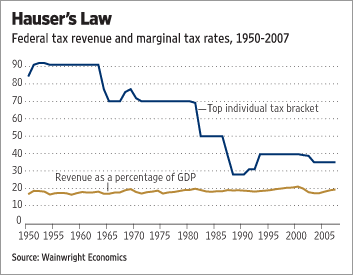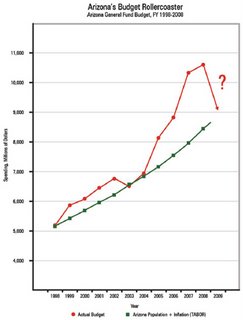It's tax season now, and with the federal government on an unprecedented spending spree, politicians' proposals inevitably turn to collecting taxes owed under the law, but never paid. Closing the so-called "tax gap" is an easy sell to the public because it sounds like simple fairness. It also avoids unpleasant talk about raising taxes. But the IRS is already the envy of international tax collectors for its results. And trying to collect the elusive billions that remain outside official reach would mean an escalating and doomed war by the government against the American people.
The latest income tax compliance figures for the United States, released by the Internal Revenue Service, put compliance with the tax code (PDF) at about 84%. That means that 16% of all taxes the government claims it is owed are never paid.
[T]he Internal Revenue Service (IRS) estimated that for tax year 2001, taxpayers paid about 84 percent of the taxes that should have been paid on time under the law, resulting in an estimated gross tax gap of $345 billion."
-- Government Accountability Office
Those hundreds of billions of uncollected dollars have politicians salivating. What less provocative way could there be for funding the government's ever-growing wish list (or, maybe, reducing the debt just a tad) than by going after money that is owed under existing tax laws, but which is being hidden from the IRS?
After all, it's about making people pay their fair share, isn't it?
But there's a difference between fever dreams of 100% compliance and the real world, and the fact is that no law ever achieves complete compliance. In fact, the IRS is already the envy of tax collectors around the world for the relatively large degree of cooperation it receives from the American people, resulting in a smaller tax gap than other nations could ever hope to achieve.
What do I mean?
First, you have to understand that the IRS is one of the few tax agencies to release its compliance figures. When you look at the numbers for other countries -- painstakingly compiled by independent economists -- the reason is clear.
In What Explains Tax Evasion: An Empirical Assessment Based on European Data (PDF), a paper repared for the Vienna Institute for International Economic Studies, authors Edward Christie and Mario Holzner calculated tax compliance rates for European Union members and several candidate countries.
In terms of personal income tax, the most recent compliance rates calculated in the paper are shown below. For the purposes of a more apples-to-apples comparison, I've used numbers only from more-developed Western European countries:
Personal Income Tax
Compliance Rates
in Europe | Austria | 74.80% |
| Belgium | 70.15% |
| France | 75.38% |
| Germany | 67.72% |
| Italy | 62.49% |
| Netherlands | 72.84% |
| Portugal | 68.09% |
| United Kingdom | 77.97% |
A separate paper, Tax Evasion in Switzerland: The Roles of Deterrence and Tax Morale (PDF), puts Swiss income tax compliance at 77.7%.
Is anything jumping out at you? How about the fact the U.S. tax compliance, at 84%, is higher than other countries have been able to manage?
The "why" of tax compliance rates certainly depends on a variety of factors, and these likely vary a bit from country to country. Christie and Holzner point to the complexity of tax systems (interestingly, they believe that too much simplicity may reduce compliance), corruption and income inequality as potential influences on tax compliance.
Overall, though, Christie and Holzner conclude that tax rates matter -- when rates are higher, people hide more money; when rates come down, people put less effort into evading the authorities. "[W]e found as our most general result that tax evasion is positively correlated with the tax rate itself ... reducing average effective tax rates should positively impact on compliance rates."
[W]e found as our most general result that tax evasion is positively correlated with the tax rate itself ... reducing average effective tax rates should positively impact on compliance rates."
That's not that surprising, is it? If you raise the price of anything, fewer people are willing to pay. There's no reason that shouldn't go for government as much as for cars or potato chips.
But governments are the only vendors that don't let customers walk away. And the Obama administration's emphasis on tax enforcement, with increased IRS audits and every possible effort to close the tax gap, isn't exactly a new idea.
In Germany, ferocious tax police are kicking in doors in an effort to squeeze the last euro from tax evaders great and small. The German authorities have even taken to paying for data stolen from banks in other countries in an effort to find where the money is hidden.
And still the underground economy, beyond the reach of tax authorities, grows along with the government's appetite.
Similar abuses by tax collectors in the United States led to congressional hearings a decade ago. Tax agents were waging SWAT-style raids on homes and businesses, pointing guns at people, and generally acting like an occupying army. The IRS pulled in its horns after public outrage led to tongue-lashings by powerful lawmakers and much embarrassment.
But when a government is running multi-trillion-dollar deficits and has abandoned any pretense of fiscal discipline, that tax gap starts looking like a piggy bank, and there are always tax collectors willing to do some smashing.
The international experience suggests that enforcement efforts don't do much to budge the bottom line. Compliance is largely a matter of finding the right price. Keep taxes within an acceptable range and maintain a system that people perceive as reasonably fair, and you'll get a decent amount of compliance (but never 100%). Raise the price, and people stop paying.
Right now, the Obama administration is talking about raising taxes on higher-income Americans. If the economists are right about the record of taxes and tax enforcement around the world, that will lead to higher levels of non-compliance, no matter what enforcement efforts are put in place.
And kicking in doors and staging intrusive audits runs the risk of making the government "the enemy" in the eyes of many Americans. That means a big hit on the "tax morale" that helps determine taxpayers' willingness to cooperate with the authorities. Nobody willingly surrenders their lunch money to somebody they hate.
So the tax gap will grow even as enforcement efforts become more intrusive and brutal.
When government officials don't get what they want, they tend to escalate. That has happened with Prohibition, the war on drugs, efforts to stamp out Internet gambling -- and tax enforcement. Tactics get nastier, and nastier, and -- as they don't achieve the desired result -- turn increasingly abusive.
So, as politicians and talking heads chatter on about closing the tax gap, keep in mind that they're talking about waging an unwinnable but still nasty war -- against you.
Labels: render unto Caesar





